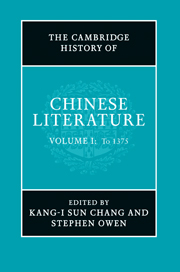Book contents
- Frontmatter
- Introduction
- 1 Early Chinese literature, beginnings through Western Han
- 2 From the Eastern Han through the Western Jin (ad 25–317)
- 3 From the Eastern Jin through the early Tang (317–649)
- 4 The cultural Tang (650–1020)
- 5 The Northern Song (1020–1126)
- 6 North and south: the twelfth and thirteenth centuries
- 7 Literature from the late Jin to the early Ming: ca 1230–ca 1375
- Select bibliography
- Glossary
- Index
- References
6 - North and south: the twelfth and thirteenth centuries
Published online by Cambridge University Press: 28 May 2011
- Frontmatter
- Introduction
- 1 Early Chinese literature, beginnings through Western Han
- 2 From the Eastern Han through the Western Jin (ad 25–317)
- 3 From the Eastern Jin through the early Tang (317–649)
- 4 The cultural Tang (650–1020)
- 5 The Northern Song (1020–1126)
- 6 North and south: the twelfth and thirteenth centuries
- 7 Literature from the late Jin to the early Ming: ca 1230–ca 1375
- Select bibliography
- Glossary
- Index
- References
Summary
Literature in the age of “China turning inward” Shuen-fu Lin
The Northern Song’s fall to the Jurchens
In 1114 the Jurchens, a semi-agricultural, fishing, and hunting people based in eastern Manchuria, rose up in rebellion against the Khitan Liao empire, the most powerful northern neighbor of the Song, occupying a vast territory that extended from Manchuria to Inner Asia. Led by Aguda (1068-1123), the Jurchens proclaimed their own Jin dynasty in 1115 and began their destruction of the Liao with lightning speed. They took the Liao Northern Capital at the juncture of Shira Muren river and the Liao river of central Manchuria in 1120. In that year the Jin and the Song formed an alliance against the Liao, agreeing that the Jin would return to the Song the Sixteen Prefectures on the northern border occupied by the Liao, and that the Song would transfer to the Jin the annual indemnities and other obligations they owed to the Liao. The two sides also agreed to launch their coordinated attacks in 1122, with the Jin working to drive the Liao from their Central Capital about a hundred miles south of the Northern Capital, and the Song to take the Liao Southern Capital at the site of present-day Beijing. Because of the Song’s failure to meet their side of the agreement, the alliance broke down. Early in 1122 the Jin took the Liao Central Capital and then continued on to take the Western Capital in Datong in modern northern Shanxi as well. Impatient with their Song allies, the Jurchens went on to take the Southern Capital at the end of 1122, and after sacking it, turned it over to the Song.
- Type
- Chapter
- Information
- The Cambridge History of Chinese Literature , pp. 465 - 556Publisher: Cambridge University PressPrint publication year: 2010
References
- 1
- Cited by



